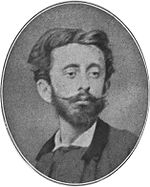Tristan Corbière
- View a machine-translated version of the French article.
- Machine translation, like DeepL or Google Translate, is a useful starting point for translations, but translators must revise errors as necessary and confirm that the translation is accurate, rather than simply copy-pasting machine-translated text into the English Wikipedia.
- Consider adding a topic to this template: there are already 6,211 articles in the main category, and specifying
|topic=will aid in categorization. - Do not translate text that appears unreliable or low-quality. If possible, verify the text with references provided in the foreign-language article.
- You must provide copyright attribution in the edit summary accompanying your translation by providing an interlanguage link to the source of your translation. A model attribution edit summary is
Content in this edit is translated from the existing French Wikipedia article at [[:fr:Tristan Corbière]]; see its history for attribution. - You may also add the template
{{Translated|fr|Tristan Corbière}}to the talk page. - For more guidance, see Wikipedia:Translation.
Tristan Corbière | |
|---|---|
 Portrait of Tristan Corbière, ca. 1865 | |
| Born | Édouard-Joachim Corbière (1845-07-18)18 July 1845 Morlaix, Brittany, France |
| Died | 1 March 1875(1875-03-01) (aged 29) Morlaix, Brittany, France |
| Occupation | Poet |
| Genre | Poetry |
| Literary movement | Symbolism |
Tristan Corbière (18 July 1845 – 1 March 1875), born Édouard-Joachim Corbière, was a French poet born in Coat-Congar, Ploujean (now part of Morlaix) in Brittany, where he lived most of his life before dying of tuberculosis at the age of 29. He was a French poet, close to Symbolism, and a figure of the "cursed poet".[1]
He is the author of a single collection of poetry Les Amours Jaunes, and of a few prose pieces. He led a mostly marginal and miserable life, nourished by two major failures due to his bone disease and his "ugliness" which he enjoyed accusing: the first is his sentimental life (he only loved one woman, called "Marcelle" in his work), and the second being his passion for the sea (he dreamt of becoming a sailor, like his father, Édouard Corbière). His poetry carries these two great wounds which led him to adopt a very cynical and incisive style, towards himself as much towards the life and world around him.
He died at the age of 29, possibly from tuberculosis, a childless bachelor with no work, entrenched in his old Breton manor, misunderstood by his contemporaries, and his innovative poetry was not recognised until well after his death.
Family and schooling
His mother Marie-Angélique-Aspasie Puyo, 19 years old at the time of his birth, belonged to one of the most prominent families of the local bourgeoisie. His father was Antoine-Édouard Corbière, known for his best-selling novel Le Négrier. A cousin, Constant Puyo, was a well-known Pictorialist photographer.
During his schooling at the Imperial Lycée of Saint-Brieuc where he studied from 1858 until 1860, he fell prey to a deep depression, and, over several freezing winters, contracted the severe rheumatism which was to disfigure him. He blamed his parents for having placed him there, far from his family's care and affection. Difficulties in adapting to the harsh discipline of the college's noble débris[2] (distinguished relics, i.e., teachers) gradually developed those characteristics of anarchic disdain and sarcasm which were to give much of his verse their distinctive voice.
Poetry
Corbière's only published verse in his lifetime appeared in Les amours jaunes, 1873, a volume that went almost unnoticed until Paul Verlaine included him in his gallery of poètes maudits (accursed poets). Thereafter Verlaine's recommendation was enough to establish him as one of the masters acknowledged by the Symbolists, and he was subsequently rediscovered and treated as a predecessor by the surrealists.[3]
Close-packed, linked to the ocean and his Breton roots, and tinged with disdain for Romantic sentimentalism,[4] his work is also characterised by its idiomatic play and exceptional modernity. He was praised by both Ezra Pound and T. S. Eliot (whose work he had a great influence on).[5]
Eliot used his self-description as "Mélange adultère de tout" as the title for one of his own (French) poems.[6] Many subsequent modernist poets have also studied him,[7] and he has often been translated into English.[8]
His complete poems appear in two volumes with translations by the English poet Christopher Pilling.[9][10]
See also
References
- ^ Verlaine, Paul (1884). Les Poètes maudits, 1884: Tristan Corbière, Arthur Rimbaud, Stéphane Mallarmé.
- ^ Renzo Paris (ed) Corbière:Gli Amori gialli, Milan 2004 p.vii
- ^ Wallace Fowlie, Poem and Symbol (2010) p. 94
- ^ Geoffrey Brereton, A Short History of French Literature (1954) p. 299
- ^ Warner, Val (2003). Centenary Corbière. New York: Routledge. ISBN 0-415-96939-5.
- ^ Wallace Fowlie, Poem and Symbol (2010) p. 96
- ^ S. Cushman et al eds., The Princeton Encyclopedia of Poetry and Poetics (2012) p. 891
- ^ Val Warner intro, Centenary Corbière (2003)
- ^ These jaundiced loves A translation of Tristan Corbière's Les Amours Jaunes by Christopher Pilling. (Calstock Cornwall: Peterloo Poets, 1995)
- ^ Oysters, Nightingales and Cooking-Pots: Selected Poetry and Prose of Tristan Corbière, trans. by Christopher Pilling, ed. by Richard Hibbitt and Katherine Lunn-Rockliffe (York: White Rose University Press, 2018). Open access publication; free on https://universitypress.whiterose.ac.uk/site/books/10.22599/Corbiere/
External links


- Works by Tristan Corbière at Project Gutenberg
- Works by or about Tristan Corbière at Internet Archive
Content in this edit is translated from the existing French Wikipedia article at fr:Tristan Corbière; see its history for attribution.












